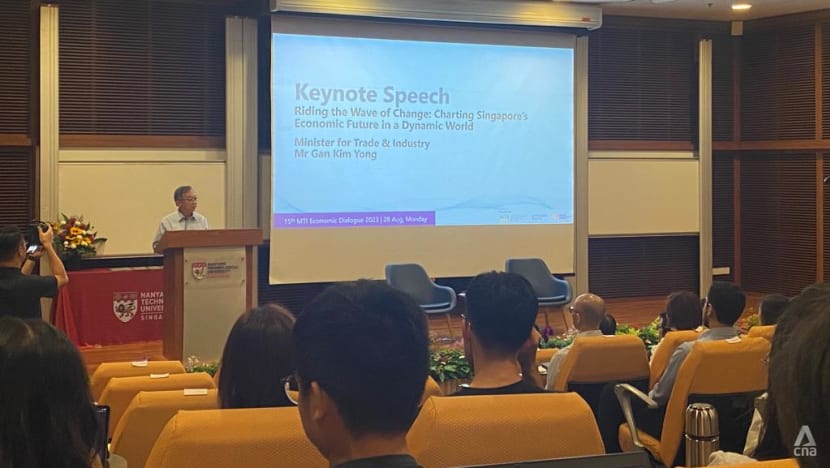Singapore exploring 'new tools' to 'manage significant investments into critical entities': Gan Kim Yong
Singapore is facing “significant challenges” in the global economy and there is a need to strengthen the country’s position as “a trusted hub for businesses to invest with confidence”, says Trade and Industry Minister Gan Kim Yong.

Trade and Industry Minister Gan Kim Yong speaking at the ministry’s annual economic dialogue on Aug 28, 2023. (Photo: CNA/Tang See Kit)
SINGAPORE: Singapore is exploring “new tools” to “manage significant investments into critical entities”, said Trade and Industry Minister Gan Kim Yong on Monday (Aug 28).
The minister, who was speaking to reporters on the sidelines of his ministry’s annual economic dialogue, did not elaborate on what these new tools or critical entities would be.
He said the new move comes as Singapore faces “significant challenges” in the global economy and there is a need to strengthen the country’s position as “a trusted hub for businesses to invest with confidence”.
“To do that, we will need to make sure that investments into critical entities do not affect Singapore's economic resilience and our national security interest,” said Mr Gan.
“That is why (the) Ministry of Trade and Industry is exploring new tools to allow us to manage significant investments into critical entities.”
Mr Gan added that many countries around the world are already doing so.
Moving forward, his ministry will engage “industries to better understand their … perspectives and to work with them to minimise the impact on businesses and investments”.
Several countries have in recent years introduced or strengthened measures to subject investments in strategically important sectors or companies to greater scrutiny.
In the UK, the National Security and Investment Act, which came into force in January last year, allows the UK government to block or impose remedies on investments deemed to pose a national security risk.
More recently, Germany has said it wants to tighten the process for reviewing foreign investments with a new law that would aim to enhance economic security, according to a Reuters report.
Within Asia, China prohibits or restricts foreign investments in certain sectors listed on a “negative list” under its Foreign Investment Law. These sectors where foreign investments are off-limits include nuclear power plants, publishing and telecom.
Earlier at the dialogue session, Mr Gan delivered a speech where he touched on the global challenges confronting Singapore.
“We exited the acute phase of the COVID-19 pandemic earlier this year, but we have stepped into a rather unstable and unpredictable environment. New challenges have emerged and in some instances, are intensifying,” he said.
These include slower global growth amid monetary policy tightening worldwide to combat inflation, the multilateral open trading system coming under pressure, the rise of new technology such as generative artificial intelligence (AI) that has disrupted industries and businesses, as well as climate change.
However, these “daunting” challenges can also present opportunities for Singapore, the minister said.
Singapore, for one, can continue to distinguish itself as “a trusted and reliable trading partner”. The emergence of new technologies and the net zero transition also serve up opportunities to grow the country’s digital and green economy, respectively.
Efforts to capitalise on these opportunities are underway, said Mr Gan, pointing to the Singapore Economy 2023 vision announced last year. This vision comprises strategies to achieve long-term growth by expanding trade, growing the manufacturing and services industries, as well as uplifting enterprises and workers.
More can be done and these include having an agile workforce and strengthening Singapore’s economic connectivity to new markets and appeal as a business hub, the minister said.
“Singapore must resist the pressure to turn inward and become more protectionist,” Mr Gan said. “We have always earned our living by remaining open, expanding our economic space, and staying connected to the world.”

















